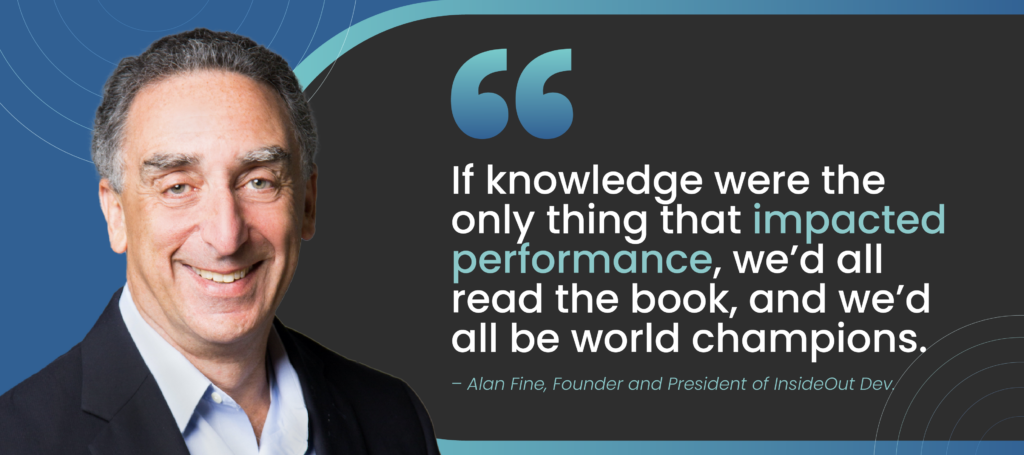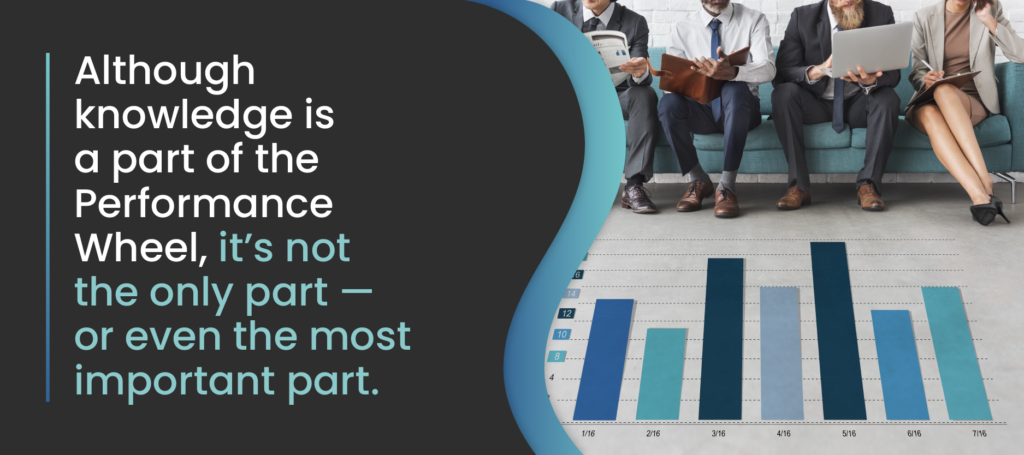We firmly believe that every individual possesses untapped potential, ready to be unleashed for elevated learning and performance. The role of a manager, therefore, encompasses the art of extracting greatness from employees, pushing them to peak performance, and unlocking their inherent potential.
By deciphering the fundamental components of performance, a coach gains precision in targeting their coaching efforts, thereby amplifying their impact. In our approach, we’ve distilled these essential performance elements into what we call the Performance Wheel.
Delving into the intricacies of the Performance Wheel empowers coaches and individual contributors alike to discern avenues for performance enhancement. It becomes a roadmap, guiding the application of the GROW ® Model — a tool that transforms identified areas for improvement into actionable steps, fostering continuous growth and achievement.
Knowledge and the Performance Wheel
Knowledge is the most obvious source of performance. Information informs our performance; in any task, there is a basic level of know-how required to achieve competence.
There are two elements to knowledge: data and the perception of that data. A computer has a certain degree of knowledge based on the data it processes. But at some point, computers need a human to interpret that data into actionable results.
Often we treat performers like computers, inputting more data (knowledge) and expecting it to improve results. But computers don’t make decisions — people do. And people are influenced by their perception of knowledge.
The Psychology Behind Knowledge: Why It Doesn’t Always Lead to Wise Decisions
Dan Kahan, Professor of Psychology at Yale Law School, looked into why equally smart, educated people with the same skills in critical thinking can come to such different conclusions regarding political issues — even those based in science, like global warming and nuclear power use.
“Knowledge may not lead you to the right answer,” psychology professor Ira Hyman, Jr. explains. “Being smart makes you better at supporting your preferred answer…More information and better thinking skills can make things worse.”
The International Journal of Project Management published a study that quantifies the impact of knowledge on project performance. According to this study, knowledge explains 38% of the variance in business value.
There are clearly times when more knowledge is exactly what’s needed to improve business results. But what about the other 62% of performance?

In their book, The Knowing-Doing Gap, Stanford University professors Jeffery Pfeffer and Robert Sutton point out that thousands of books are published each year that essentially contain the same analyses and prescriptions contained in books published a year or even a decade ago.
“Yet,” they say, “these books have a ready market because the ideas, although often widely known and proven to be useful and valid, remain unimplemented…Anyone can read a book or attend a seminar. The trick is in turning the knowledge acquired into action.”
In most instances, the problem isn’t a lack of knowledge but rather getting people to take consistent action on what they know. Once a baseline competency is established, the impact of knowledge on performance experiences diminishing returns.
Here is where the other three elements of performance improvement become even more critical: Faith, Fire, and Focus.
Faith, Fire, and Focus: What Really Drives Performance

Understanding the other elements of the Performance Wheel allows coaches and individual contributors to identify how performance can be improved and use the GROW Model to make it happen. Learn more about these elements of performance:
We’ve also compiled a simple guide that details what drives high performance. Download it now to learn more.
{{cta(‘0890ea83-b9c6-4bf2-8e2a-9f1c68b1872b’,’justifycenter’)}}


